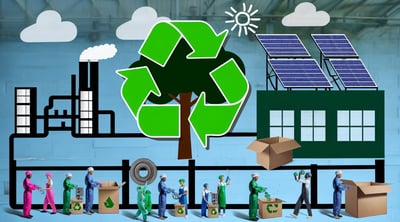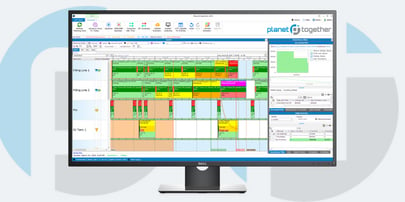Scheduling for Sustainable and Eco-Friendly Manufacturing
Sustainability and eco-friendliness have become crucial considerations for manufacturing facilities across various industries. As a Production Scheduler in a Packaging manufacturing facility, you play a pivotal role in optimizing production processes while also contributing to environmental responsibility.
In this blog, we will explore the importance of scheduling for sustainable manufacturing and how integration between PlanetTogether, a powerful production scheduling tool, and ERP (Enterprise Resource Planning), SCM (Supply Chain Management), and MES (Manufacturing Execution Systems) can help your facility achieve its sustainability goals.

The Growing Emphasis on Sustainability in Manufacturing
Sustainability has evolved from being a buzzword to a fundamental driver of business success. Customers, investors, and regulatory bodies are increasingly demanding that companies reduce their environmental footprint and adopt eco-friendly practices. Manufacturing facilities are no exception, as they are often significant contributors to environmental challenges such as greenhouse gas emissions, waste generation, and resource depletion.
Reducing Energy Consumption: Efficient production scheduling can help minimize energy consumption by optimizing machine usage, production sequences, and downtime. This results in cost savings and a reduced carbon footprint.
Minimizing Material Waste: Improved scheduling ensures that resources like raw materials and packaging materials are used efficiently, reducing waste and lowering the environmental impact associated with disposal.
Lowering Emissions: Scheduling can minimize idle times and reduce emissions from machines, helping companies meet emission reduction targets and comply with environmental regulations.
Optimizing Transportation: By synchronizing production schedules with transportation schedules, facilities can reduce transportation-related emissions and costs, contributing to a greener supply chain.

The Role of Production Schedulers in Sustainability
As a Production Scheduler, you are in a unique position to drive sustainability initiatives within your packaging manufacturing facility. Your responsibilities include:
- Creating production schedules that minimize downtime and maximize machine efficiency.
- Balancing production demand with resource availability.
- Ensuring on-time delivery to customers while minimizing rush orders and overtime.
- Reducing setup times and changeovers to optimize production runs.
- Coordinating with various departments such as production, maintenance, and logistics.
By focusing on these key areas, you can make a significant impact on your facility's sustainability efforts. However, achieving these goals requires advanced scheduling tools and integration with ERP, SCM, and MES systems to ensure seamless operations.


The Power of PlanetTogether in Sustainable Scheduling
PlanetTogether is a state-of-the-art production scheduling software that offers a range of features to help Production Schedulers like you meet sustainability targets. Let's delve into some of the capabilities that make PlanetTogether an essential tool for eco-friendly manufacturing:
Real-Time Data Integration
PlanetTogether allows you to integrate real-time data from your ERP, SCM, and MES systems. This integration enables you to access up-to-date information about inventory levels, machine status, and customer orders. With this data at your fingertips, you can make informed decisions to optimize scheduling for sustainability.
Demand Forecasting
Accurate demand forecasting is crucial for sustainability. PlanetTogether's forecasting capabilities help you anticipate customer demand, allowing you to adjust production schedules accordingly. This minimizes overproduction, reduces waste, and ensures that resources are used efficiently.
Resource Optimization
PlanetTogether optimizes the allocation of resources such as machines, labor, and materials. By balancing resource usage, you can reduce energy consumption, minimize material waste, and lower operational costs—all of which contribute to sustainability.
Downtime Reduction
One of the most significant contributors to environmental impact in manufacturing is machine downtime. PlanetTogether's scheduling algorithms minimize idle times by efficiently sequencing jobs, reducing setup times, and automating changeovers.
Green Supply Chain Management
PlanetTogether can extend its scheduling capabilities to your supply chain by integrating with your SCM system. This ensures that transportation schedules align with production schedules, reducing emissions and transportation costs.

Integration with ERP, SCM, and MES Systems
The true power of PlanetTogether lies in its seamless integration with other critical systems in your organization. Let's explore how this integration enhances sustainability efforts:
ERP Integration
Integration with your ERP system ensures that you have access to real-time data on orders, inventory levels, and financial information. This data helps you make scheduling decisions that align with your company's financial goals while minimizing waste and energy consumption.
SCM Integration
Integrating PlanetTogether with your SCM system enables end-to-end visibility into your supply chain. You can optimize production schedules based on supply chain constraints, reducing lead times, and streamlining transportation, ultimately contributing to a more sustainable and responsive supply chain.
MES Integration
MES integration enhances communication between production and scheduling, allowing for immediate feedback on machine status and production progress. This real-time data exchange helps you make on-the-fly adjustments to maintain sustainability goals and minimize disruptions
As a Production Scheduler in a Packaging manufacturing facility, your role is pivotal in achieving sustainability and eco-friendliness. By harnessing the power of PlanetTogether and integrating it with ERP, SCM, and MES systems, you can optimize production schedules, reduce waste, minimize energy consumption, and contribute to a greener supply chain.
The path to sustainability is not only responsible but also financially sound. Sustainable practices often result in cost savings, improved customer satisfaction, and enhanced brand reputation. Embrace the opportunities presented by advanced scheduling tools and integration with enterprise systems to create a more sustainable and eco-friendly manufacturing future.
Remember, scheduling for sustainability is not just a choice; it's a responsibility—one that you, as a Production Scheduler, are well-equipped to fulfill. Embrace the challenge, and let PlanetTogether be your partner on this journey towards a greener and more sustainable manufacturing facility. Together, we can create a better future for our planet and future generations.